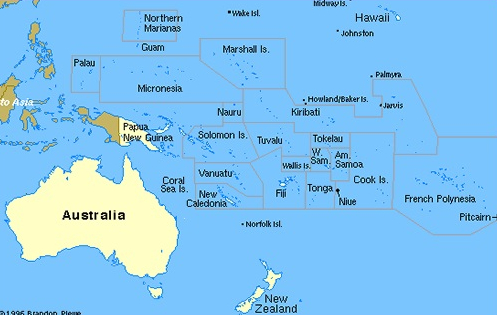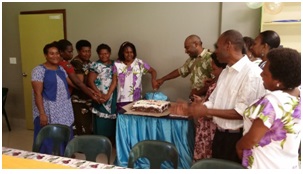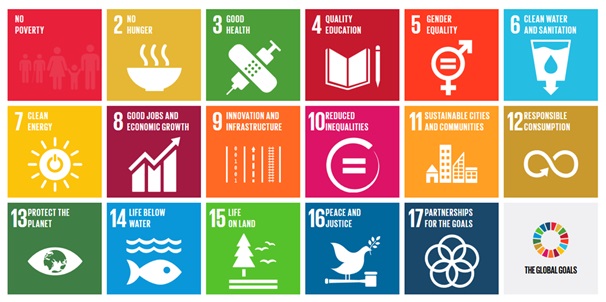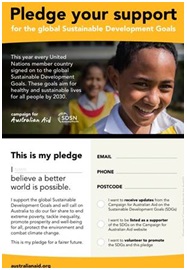|
|
Welcome to our International newsletter, covering the latest on our work in the Pacific region where Family Planning NSW operates as Family Planning Australia.
In this issue, we report on the Pacific Islands Forum Leaders Meeting, held last week in Port Moresby, where our submission on the need to address cervical cancer across the Pacific was one of five top priority issues for the region considered by Leaders. It is very encouraging to see Forum Leaders acknowledge the devastating impact of this disease upon individuals, families and communities in the Pacific, and we hope Leaders commit to joint effort to address it.
Family Planning Australia undertakes life-saving cervical cancer screening and treatment work in the Pacific thanks to financial support from the Department of Foreign Affairs and Trade and public donations. Our ability to roll our program out more broadly across Pacific Island nations is only limited by our access to additional funding to support this work. Donations to Family Planning NSW can be made via our website www.fpnsw.org.au |
|
|
|
 |
|
|
Pacific Island Leaders are being urged to address cervical cancer prevention and treatment in the Pacific, following consideration of Family Planning NSW’s submission on the issue at the 46th Pacific Islands Forum Leaders’ Meeting held in Port Moresby on 8-10 September.
The forum, a collective of civil society organisations, Troika leaders and Government representatives from across the Pacific, produced a Communique that sets out positions and actions to be included in a Framework for Pacific Regionalism.
“There is an urgent need to address cervical cancer in the Pacific. It is the second most common cancer in women worldwide and every year, more than 270,000 women die from cervical cancer with more than 85% of deaths occurring in low income countries. Women in Papua New Guinea are dying of cervical cancer at 13 times the rate of women in Australia, yet this is a preventable cancer”, said Ann Brassil, CEO, Family Planning NSW. “Very few families in the Pacific would be untouched by this.”
The lack of screening and treatment programs in Pacific countries means a significant proportion of cases are diagnosed at an advanced stage, leading to a high mortality rate and a high cost burden on local communities and health systems.
Ms. Emeline Siale Ilolahia, Executive Director of the Civil Society Forum of Tonga, echoed the impact this cancer has on all women. “As a Pacific Island woman, daughter, mother, sister, and aunty I know the need to remove fear of cervical cancer. This can be achieved through mobilising resources of Forum countries and partners and we encourage this to happen. I don't want any more girls to grow up with fear of cervical cancer.”
We are urging Pacific leaders and the Australian government to prioritise resourcing for screening and treatment programs to end preventable deaths.
Since 2010, we have worked with local governments and health services across Fiji, the Solomon Islands, Vanuatu and the Cook Islands piloting cervical cancer training and screening programs, and we have worked with the Fiji Ministry of Health and Medical Services to develop a national screening policy, so we know a regional approach can work and save countless lives.
In Fiji we implemented a low resource cervical cancer screening method- using visual inspection with acetic acid- and immediate treatment of detected lesions with cryotherapy. This program is now being adapted for implementation in the Solomon Islands, at the request of the Solomon Islands government.
This year, we will commence working in Vanuatu to support the Australian Cervical Cancer Foundation and the local Ministry of Health to implement a cervical cancer prevention program using HPV vaccination and screening with HPV DNA testing.
We are able to undertake this life saving work in the Pacific thanks to financial support from the Department of Foreign Affairs and Trade and public donations. Our ability to roll this program out more broadly across Pacific Island nations is only limited by our access to additional funding to support this work.
Donations to Family Planning NSW can be made via our website www.fpnsw.org.au
|

|
|
 |
Family Planning Australia’s work in the Pacific to help the poor and disadvantaged access family planning and reproductive and sexual health information and services is made possible through funding from Department of Foreign Affairs and Trade, private donors and grants.
In 2015 -16 the Australian Government is funding Family Planning Australia to deliver six reproductive and sexual health related projects in five Pacific countries.
- Cervical cancer prevention in Vanuatu and Solomon Islands
- Increasing access to contraception for young people in Vanuatu
- Increasing access to sexuality education for students with disability in Fiji
- Working with men to improve reproductive and sexual health and reduce gender violence in Timor Leste and Papua New Guinea
Our local partners for this important work include:
- Vanuatu Family Health Association
- Solomon Islands Ministry of Health and Medical Services
- Reproductive and Family Health Association of Fiji
- Café Cooperativa Timor Leste
We also work closely with Australian partners such as the Australian Cervical Cancer Foundation.

|
 |
|
|
|
 |
We were delighted to celebrate the graduation of 13 students from our Post Basic Sexual and Reproductive Health course, in Morobe Province, Papua New Guinea in July this year.
This course aims to increase local health workers knowledge of sexual and reproductive health care – recent data shows maternal and infant mortality rates worsening in PNG so the need for the course is great.
Graduating students are now able to treat and assist patients with a wide variety of reproductive and sexual health concerns, including sexually transmissible infections (STIs) and contraception, take medical histories and communicate issues of confidentiality and privacy with patients, and pass on their training to other health professionals.
The women and men who completed the course should be proud of their enormous achievement – many studied late into the night by the light of oil lanterns to complete the rigorous assessment requirements whilst working full time and raising families. They were enormously assisted and supported by our wonderful clinical educator, Bejone Dotaona.

In the words of one of the graduates:
“The course opened my eyes on how to deal with issues that are rather delicate. It has given me confidence to address issues such as HIV and AIDS, STIs and gender based problems without fear or favour”.
The graduation ceremony was attended by Mr Micah Yawing, Provincial Program Health Advisor, Mrs Modi Pontio, Deputy Country Director of Population Services International and Family Planning NSW CEO, Adj. Prof Ann Brassil.
Mr Yawing, an active supporter of the course, said, “The training has been so successful, with our trainees being able to identify and manage reproductive and sexual health cases… I have a strong belief this course will go a long way in up-skilling our health workers to better treat and manage patients.”
Family Planning NSW CEO Ann Brassil also commended the graduating students. “These individuals have managed their work, families and other responsibilities while making the commitment to study, which is never easy. The support of family and employers is also essential to giving individuals the chance to participate in this sort of training, so it’s really a community effort, with benefits that will be seen across the Province.”
We received funding to run the course from the FP Archer Charitable Trust, managed by Perpetual, and the Australian Government. Unfortunately, despite the importance of this course, it will not run in 2016 due to lack of funds.
 |
|
 |
The Pacific Society of Reproductive Health (PSRH) Conference was held from 7 to10 July 2015 at the University of the South Pacific campus in Suva, Fiji. The theme of the conference was Reproductive Health in the Pacific Beyond 2015 - greater investments and partnerships for improved results.
Catherine McGowan, Nurse Educator for Family Planning Australia delivered an evaluation on the IPPF-funded project, Building the sexual and reproductive health workforce in the Pacific: Outcomes from an education program for nurses and community educators in eight Pacific countries. Ms McGowan also presented an overview of Family Planning’s cervical cancer work in the region Cervical cancer prevention in the Pacific.
Our work on cervical screening attracted interest from several Pacific country representatives where deaths from cervical cancer are ten times that of Australia.
The Pacific Journal of Reproductive Health was also launched at the conference, as was the Pacific Emergency Maternal and Neonatal Training Manual, both the collaborative work of PSRH members.
The scientific program, delivered by key international and Pacific speakers, covered many reproductive health topics, and common cross-cutting issues pertinent to the Pacific emerged. The geographical challenge of providing effective clinical services to small populations across many islands, known as ‘the blue continent’, and the difficulties related to important data collection, were two issues addressed.
 |
|
|
|
 |
World leaders are to meet at the upcoming United Nations Sustainable Development Summit from 25 to 27 September in New York, to agree the new Sustainable Development Goals (SDGs), which will replace the soon expiring Millennium Development Goals (MGDs).

The SDGs include 17 initiatives and 169 targets that seek to transform the world by 2030, by ending poverty, hunger, conflict and gender inequality while promoting sustainability. Unlike the MDGs which were primarily seen as targets for poor countries, the SDGs are to apply to every nation.
So what does the end of the MDGS and new SDGs mean for the Pacific?
Ten of the 14 independent Pacific island states did not achieve a majority of the MDGs and three states failed to achieve any. Maternal mortality rates in particular remain unacceptably high in most Pacific countries.The new SDGs, rather than being a list of goals and targets, are primarily aspirational, and of interest to advocates of reproductive and sexual health are the new SDGs 3 and 5:
Goal 3. Ensure healthy lives and promote well-being for all at all ages
- By 2030, ensure universal access to sexual and reproductive health-care services, including for family planning, information and education, and the integration of reproductive health into national strategies and programmes.
- Achieve universal health coverage, including financial risk protection, access to quality essential health-care services and access to safe, effective, quality and affordable essential medicines and vaccines for all.
Goal 5. Achieve gender equity and empower all women and girls.
- 5 Ensure universal access to sexual and reproductive health rights as agreed in accordance with the Programme of Action of the International Conference on Population and Development and the Beijing Platform for Action and the outcome documents of their review conferences.
Civil society engagement in development of the SDGs was extensive and welcomed, and this should continue as indicators for the goals and targets continue to be negotiated to be finalised by March 2016.
 |
|

The Campaign for Australian Aid, in partnership with the Australia-Pacific Sustainable Development Solutions Network (SDSN), launched a global Sustainable Development Goals pledge on 25 August at the joint ACFID-ACOSS Civil Society SDG forum in Melbourne. The pledge is designed to engage Australians in the promise and delivery of the SDGs. It can be signed online, via postcard, or by taking a photo with a poster and uploading it to social media and using the hashtag #AustralianAid.
In recent years Australia’s foreign aid budget has suffered from successive cuts, and has lost the bi-partisan support it once held. These have dramatically set back our national contribution to the crucial progress of international development.
More than 3 million Australians, who believe we can and should do more as a nation to end extreme poverty around the world, have engaged with Campaign for Australian Aid in the first half of 2015 to pledge support for the global SDGs.
Australian Aid makes an incredible difference in the lives of people across our region, and across the world. Now is a critical time for us to stand up for this life-changing work. The campaign encourages all Australians to call on the Australian Government for a fairer Australian Aid budget to do our fair share to end extreme poverty, tackle inequality, promote prosperity and well-being for all, protect the environment and combat climate change.
|
|


